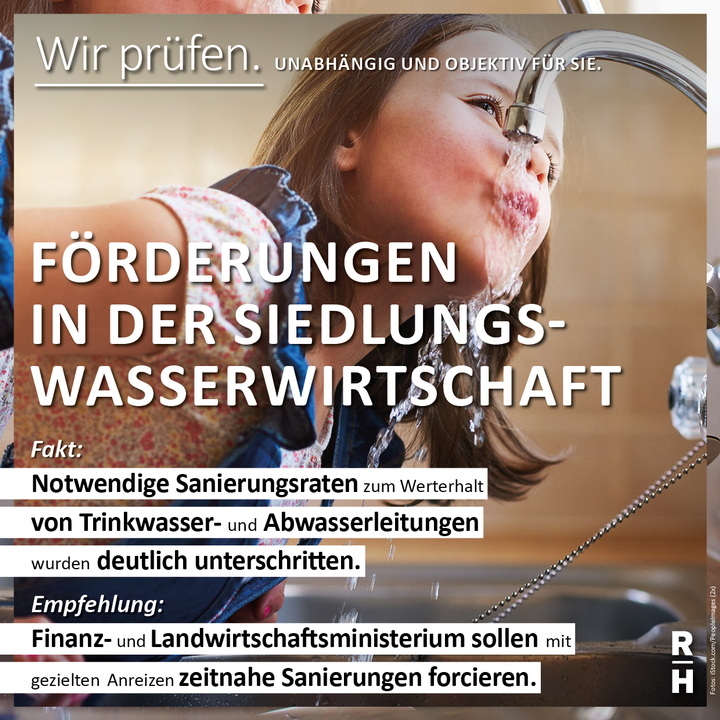The ACA points to the major need to renovate drinking and sewage pipes

In its report published today on "Subsidies for Urban Water Management", the Austrian Court of Audit (ACA) points to a heavily increasing need to renovate not only the drinking but also the sewage pipes in Austria. The auditors critically pointed to the fact that in the audited years of 2014 to 2018 the renovation rates for both drinking water supply as well as for sewage disposal had remained significantly below the rates necessary for value preservation. This could cause environmental damage if, for example, sewage water seeps into groundwater and contaminates it.
The audit aimed at assessing the framework conditions for subsidies for urban water management by the Federation and, as an example, by the province of Styria.
Dilapidated drinking water pipes
Contrary to most European countries, Austria obtains water exclusively from groundwater reserves to ensure drinking water supply. The pipe network for drinking water supply is about 81,000 km long and some 92 per cent of the population is connected to the central water supply system in Austria.
Most of the drinking water pipes were built before 1980. With increasing age, the proportion of pipes with a water loss of more than 20 per cent rose. As regards the pipes constructed before 1980, between 5.3 per cent and 8.5 per cent of the pipe network was affected. The opening of an otherwise closed pipe system allows bacteria to enter into the drinking water, whose quality is thereby affected.
An average renovation rate of two per cent per year would be necessary to perserve the value of the pipes. In fact, only 0.3 percent of the drinking water network has been renovated per year. The rate of renovation is even lower in the area of sewage disposal: here, only 0.1 per cent of the 93,000-kilometre-long sewer network has been renovated per year.
Less investments for urban water management
Urban water management is mainly financed via subsidies by the Federation and the provinces, via contributions by the users and via equity and borrowed capital by the operators. The infrastructure-related investments decreased from some EUR 1.453 billion per year in the period from 1993 to 2000 to about EUR 543 million in the period from 2015 to 2018. The funds made available by the Federal Government under the Environmental Support Act (Umweltförderungsgesetz) decreased annually from about EUR 283 million in the period from 1993 to 2000 to EUR 80 million in the period from 2017 to 2021. The objectives of the Environmental Support Act are, among others, to protect water from contamination and to ensure the supply of the population with hygienically safe drinking water.
Large renovation-related investments until 2030
Until 2030, it can be assumed that the funds needed to maintain the functioning of the water supply and sewage infrastructure will far exceed the investment volume made at the time of the audit. If the renovation rates remain low, the investment need will shift into the future. The necessary renovation measures will potentially become more expensive. Until 2030, for example, a massive increase in investment costs to preserve the value of the water supply can be expected. According to the forecast, the investment need for the supply of drinking water in 2018 was at some EUR 225 million and is likely to be at some EUR 597 million in 2030.
The ACA recommends a timely renovation
In order to be able to ensure the security of supply of drinking water and the functioning of the sewage disposal system in the long term and in a consistent quality, the ACA recommends that the Ministry of Finance and the Ministry of Agriculture use the subsidies to provide targeted incentives so that the operators of the plants, in particular municipalities and associations, carry out the necessary renovations in a timely manner.
- pdf Datei:
- 4,334.2 KB
- Umfang:
- 118 Seiten


